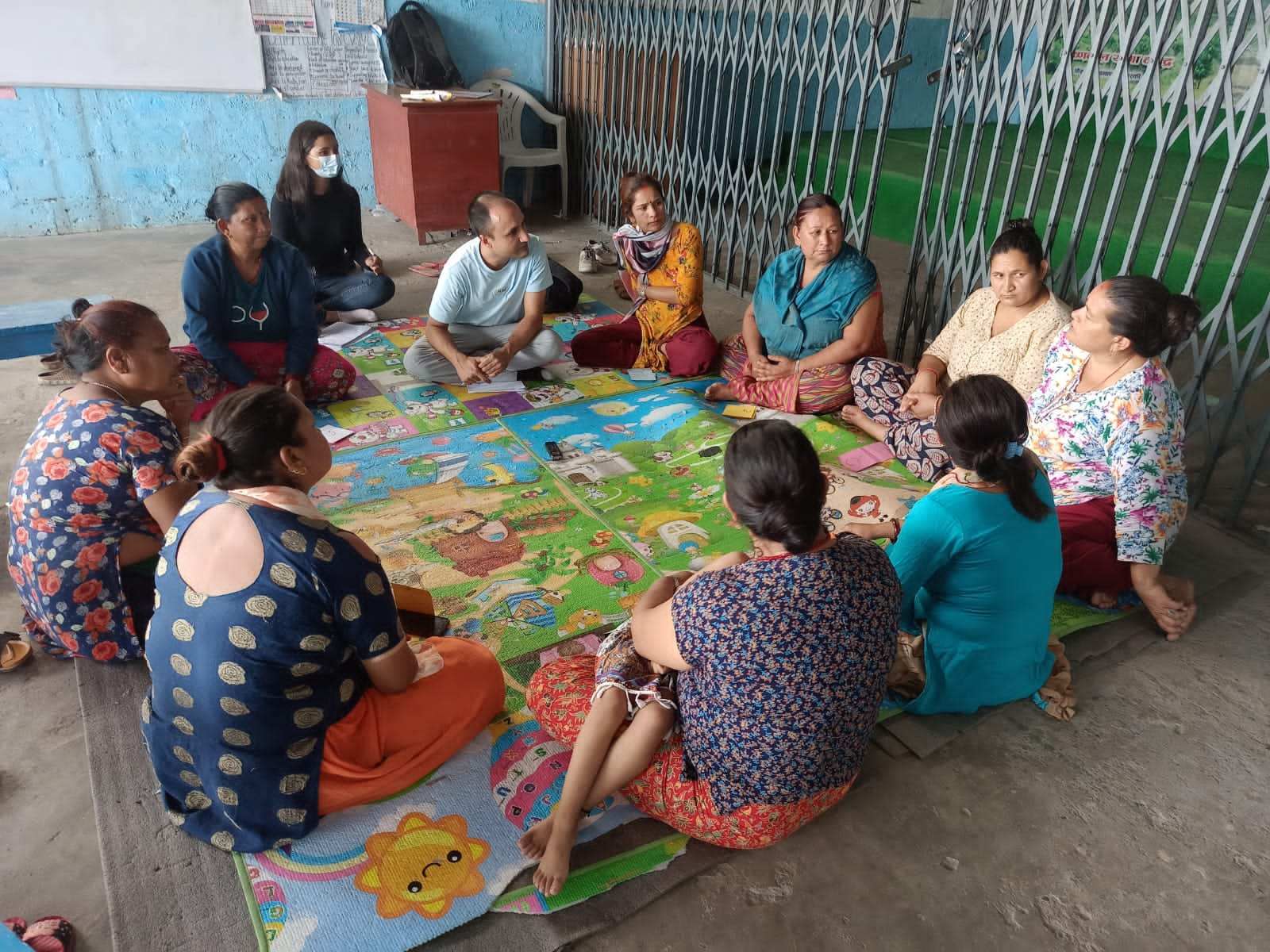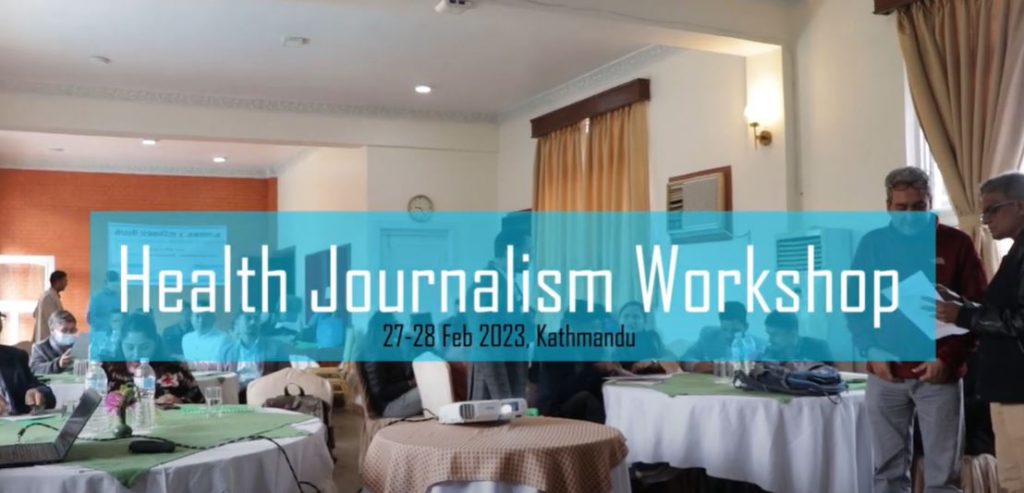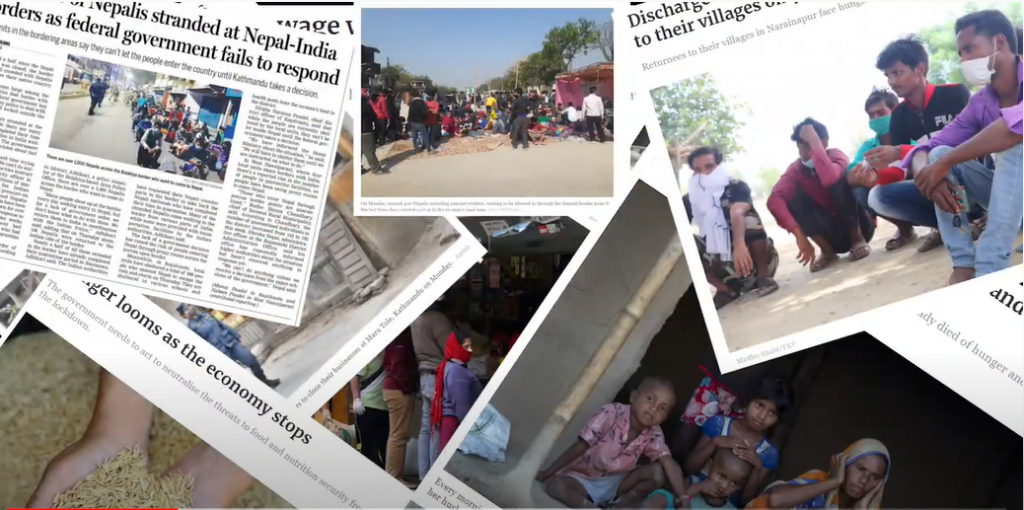The growing numbers of urban poor around the world face several health challenges including the double burden of diseases, exposure to environmental and human-made hazards and limited access to quality and affordable health care. In the context of the urban poor being overlooked in data, programmes and policies, this study aims to strengthen the urban system in Nepal. This study is part of the community-led Responsive and Effective Urban Health System – CHORUS implemented by the International Research Project Consortium (RPC) in Bangladesh, Ghana, Nepal and Nigeria. The Study in Nepal generates useful evidence to inform national and sub-national policies and program to address the quality healthcare needs of urban populations. This study’s objective is to strengthen the health system that improves urban poor access to primary health care. Our study focusses on four key themes which we call CHORUS Pillar. These include:
- Linking the plurality of health care providers.
- Building multi sectoral collaboration to address wider determinants of health.
- Strengthening systems to prevent and respond to the double burden of non-communicable (NCDs) and communicable diseases (CDs).
- Identifying, Reaching and engaging the urban poor.
CHORUS Projects in Nepal
We have two major studies on health system strengthening being implemented in Pokhara Metropolitan City in Kaski, Gandaki Provinces and Budhanikantha Municipality in Kathmandu, Bagamati Province Nepal.
- Project One: Project One: Understanding the approaches to strengthen the service delivery of non-communicable disease programmes for urban poor at the primary health care setting in Pokhara
- Project Two: Co-Designing Urban Health Data Hub: A Comprehensive Initiative in the Budhanilkantha Municipality of Kathmandu, Nepal
In CHORUS, we also have four other projects under the Innovation Fund scheme led by early/med career researchers. These projects include:
- Pathways to effective coverage for mental health services among urban adolescents
- Ethnographic Study of Intersecting Inequities of Urban Poor in Kathmandu, Nepal
- Assessing Urban Poverty and Deprivation in Nepal
- Media’s role in informing urban health policy: A cross country study of Bangladesh and Nepal
During the time of COVID-19, responding to the evolving need and situation, we conducted a study called COVID and Cities looking at COVD’s impact on urban poor, governance in COVID-19 response and Private Sector’s involvement in COVID-19 response.
Project One: Understanding the approaches to strengthen the service delivery of non-communicable disease programmes for urban poor at the primary health care setting in Pokhara
This study is implemented in Pokhara Metropolitan City (PMC), one of the most popular tourist destinations in Nepal and among top five populous cities of country. PMC comprises 33 Wards and has a total population of 5,13,504 (National Housing and Population Census 2021). About 30% of the active population is engaged in elementary work. PMC faces challenges in delivering quality basic health services including the growing burden of NCDs with Hypertension (29,848 cases) and Diabetes (25,943 cases) being the most prevalent (Nepal Burden of Disease Report, 2019). These health issues are particularly concerning in informal settlements and among the urban poor. In this context, PMC and HERD International jointly initiated a study on strengthening urban health systems as part of the Community Led Responsive and Effective Urban Health System (CHORUS), a research consortium with an aim to make urban health systems stronger and more resilient.
This participatory action research employing mixed method aiming to understand the approaches to strengthen local (municipal/urban) health system that engages with private health providers in delivering quality health services with focus on NCD prevention and care, to urban poor and marginalized.
The study has two phases:
- Need assessment and co-creation phase, through which evidence are generated to develop an intervention regarding the engagement of local health system actors and private sectors in delivering NCDs, focusing on the urban poor community; and
- ii) Implementation and evaluation phase that records baseline indicators, implements the intervention package, and evaluates the intervention packages based on the defined indicators at the baseline. The need assessment phase has been completed and the intervention designed has been completed. Based on the evidence of need assessment, We are piloting a model to link pharmacy and primary hospital run by Pokhara metropolitan city to address NCDs, particularly diabetes and hypertension.
Following the completion of need assessment, the project has entered to the phase of implementing co-designed intervention.
Project two: Strengthening urban health systems through Urban Health Data Hub: a co-design approach in the Budhanilkantha Municipality, Kathmandu, Nepal
Rapid urbanisation in Nepal has brought both opportunities and challenges, particularly in public health. The country’s urban population is rapidly growing from 17.1% in 2011 to 66.2% in 2021, and cities are expanding. As urbanisation continues to reshape communities, addressing urban health challenges becomes evident. Municipal governments and its stakeholders struggle to obtain reliable and up-to-date urban health data, impacting evidence-driven policy choices and locally tailored health interventions. To bridge these gaps, CHORUS project 2 starting from 2024 will co-designed Urban Health Data Hub in one of the municipalities in Kathmandu district.
The study aims to develop and implement a co-designed Urban Health Data Hub in the selected municipalty This hub will integrate multiple data sources for comprehensive urban health data analysis, foster stakeholder collaboration to enhance evidence-based advocacy and decision-making, and promote community-led interventions to improve health outcomes, particularly among the urban poor. The project is implemented in different phases: context review of municipal data systems in Nepal, social mapping and household survey, co-design the urban health data portal and its implementation and evaluation.
COVID-19 and Cities: A Nepal Study, 2020
The study “COVID and Cities” was conceptualized in the initial phase of CHORUS project implementation when the entire world was grappling with COVID-19 Pandemic. This study aimed to understand the response to COVID-19 in Nepal from January to August 2020 through review of mass media content and relevant policies published during the period. We identified three different news media as data source for the study based on their coverage, diversity of language, and access whereas 71 policy documents related to COVID-19 were identified for the study. This study assessed measures taken by government of Nepal to prevent and control COVID-19 and its impact on health and livelihood of the urban poor. The study reported here draws on data from a review of mass media coverage and review of policies on COVID-19 published from 1 January 2020 to 31 August 2020. Please find our policy brief, study report and journal article to know the findings of the study.
Projects under Innovation Fund Scheme
Innovation Fund is the scheme provisioned by CHORUS Research Project Consortium. The fund is targeted to early and mid-career researchers from across CHORUS partners to be used for small scale for the innovative projects. These projects aim at extending knowledge in relation to CHORUS 4 pillars, explore pillars/features in relation to groups of urban poor residents facing exclusion and discrimination, support early- and mid-career LMIC researchers to develop research and leadership skills, particularly encouraging leadership from female LMIC researchers, build and extend CHORUS’s links with emerging/new urban health organisations/stakeholders e.g. research, community organisations, local governments, health providers; and to support innovative ideas for research uptake and capacity strengthening interventions and their evaluation. The innovation fund was announced in two rounds in the past years. HERD International’s early and mid career researchers four projects have been awarded from CHORUS innovation Fund. These projects are in the early stage of the implementation. The overview of the Innovation fund projects being implemented by HERD international are as follows.
1. Pathways to Effective coverage for mental health services among urban adolescent
This study focused on developing local-based solutions to improve the coverage, utilization and adherence to mental health services in Pokhara Metropolitan City (PMC) in Nepal, prioritizing the urban poor population. The study aims to improve mental health by developing a pathway that can be supportive to increase accessibility and availability of mental health services specifically tailored for adolescents in PMC. The research will employ a mixed-methods approach, combining qualitative and quantitative methods, to provide a comprehensive understanding of the factors influencing the uptake and impact of mental health interventions in this specific population. Quantitative Data Collection will include the survey questionnaires administered among adolescents to assess knowledge, attitudes, and perceptions regarding mental health, as well as the utilization and effectiveness of existing interventions. Moreover, we will use mental health screening tools to assess the prevalence of depression. Among the students who are depressed, will be delivered basic services (e.g., behavioral activation therapy, counselling, referral). We will assess the feasibility of introducing the intervention. Interviews will be conducted among parents/guardians, mental health professionals, teachers, community leaders, and municipal authorities to explore their perspectives, experiences, and barriers to accessing and utilizing mental health interventions. The study will develop a policy brief including policy recommendations targeting local stakeholders and a journal article targeting researchers to improve the coverage and effectiveness of mental health interventions among adolescents.
2. Ethnographic Study of Intersecting Inequities of Urban Poor in Kathmandu, Nepal
The study aims to identify challenges and opportunities in ensuring equitable access to quality health services among urban poor. To achieve this, the study will understand the characteristics of urban poor and its linkages with pathways to care seeking and how gender and other social variables interacts and creates inequities in terms of access to health services. In addition, the study will look at the health policies to understand if the context of urban poor and the concept of equity and justice has been incorporated. Further the study will identify the potential areas for intervention to address the urban health issues. The research will be primarily ethnographic study in a selected urban poor settlement of Kathmandu district identified from initial listing and consultation with stakeholders. In addition policy review will be conducted with an aim to synthesize the existing understanding and evidence on intersecting inequities of urban poor. The study will focus on intersectionality as a theoretical framework and analytical approach.
3. Media’s role in informing urban health policy: A cross country study of Bangladesh and Nepal
Addressing inequity and disparities in health services requires evidence-based policy decisions to tackle emerging urban health challenges, especially those affecting the poor. Since mass media play a vital role in framing public issues and setting agendas, providing perspectives and influencing audience opinions, they are influencing stakeholders to help shape urban health policies. However, the questions such as how information are gathered by news media, what type of information are used by policy makers to address the urban health challenges are largely unknown. In this context, this study will identify sources and types of evidence used by health journalists in news media, explore the perceptions and experience of journalists translating research evidence related to public/urban health issues to inform policy-makers and to explore the perceptions and experience of health policy-makers taking up research evidence through various news media and reflecting on policies in Bangladesh and Nepal. A mixed-methods approach will be employed in this study. Initially, a quantitative online survey among the health journalists in news media will be conducted to identify the sources of information, type of information and urban health topics which get prioritized in reporting and barriers and challenges of conveying knowledge to the policy makers. Similarly, the qualitative component comprises In-depth interviews and Key-informant interviews with urban/health journalists and reporters and editors. Additionally, stakeholders involved in policymaking, including but not limited to, government officials will be engaged in this study for Key Informant and In-depth Interviews. The findings will be synthesised by integrating qualitative and quantitative data. Ultimately, the research output will be disseminated through peer-reviewed articles, project reports, policy brief, and video blog on cross-country experience on future media engagement based on evidence to promote CHORUS research uptake.
4. Assessing Urban Poverty and Deprivation in Nepal
This study will measure the urban deprivation indices, involving a review of urban deprivation indicators, evaluation of data sources for urban deprivation measurement, identification of gaps in available data, development of an Urban Deprivation Index, and collaboration with municipalities for enhance use of data and visualization, and capacity building. The research will commence with rapid review to identify and synthesize existing urban poverty measurement frameworks and urban poverty studies, particularly focusing on quantitative measurements of deprivation through established indices. This will involve examining existing datasets and identifying any gaps or limitations in the data that could impact the construction of urban poverty indices. The identification of optimal indices will be informed by comparative analyses and expert consultations. The selected indices will be used to construct feasible and effective urban deprivation indices, which will provide granular data at provincial, district and local level. This will enable policymakers and stakeholders to explore urban poverty trends visually and access key insights for informed decision-making and resource allocation.
Partners
This programme is a collaboration among the University of Leeds, University of York, HERD International Nepal, ARK Foundation Bangladesh, University of Ghana, University of Nigeria, BRAC University and London School of Hygiene and Tropical Medicine
More Details
Follow in Twitter
Associated Team Members
Shreeman Sharma
Research Uptake ManagerShreeman Sharma is a dedicated professional with a strong interest in media research, health research, health communication, and evidence uptake. He holds Master’s degrees’ in Development Management from the Asian Institute of Management and Mass Communication and Journalism from Purbanchal University. He is currently serving as a Research Uptake Manager at HERD International. Since assuming his current position in October 2020, Shreeman has taken on the role of Research Uptake Global lead for the Community-led Responsive and Effective Urban Health [...]
Learn moreSushil Chandra Baral
Managing DirectorDr. Sushil Chandra Baral is an experienced health and development expert with over 25 years of experience in research and development. Specializing in health systems, health policy, and planning at both national and international levels, Dr. Baral has played a pivotal role in communicable disease control, specifically Tuberculosis. He serves as a Managing Director at HERD International. In the past, he worked as a Strategic Advisor for the Nepal Health Sector Support Programme demonstrating expertise in program-based operational research and [...]
Learn moreShophika Regmi
Senior Manager: Health System Research, Evaluation and LearningShophika Regmi
Senior Manager: Health System Research, Evaluation and LearningAppointed as the lead for Systems, Policy and Programme Department Ms. Shophika Regmi has been working in health and social research for more than a decade. Throughout this period, she has led research projects of various natures and scales, particularly in the health sector. She possesses extensive experiences in implementation research using participatory action approaches, designing and executing evaluation studies, national level surveillance study, and large-scale survey across diverse areas such as health system strengthening, urban health, health workforce, non-communicable [...]
Learn moreAbriti Arjyal
Research Manager - Qualitative and Multidisciplinary ScienceAbriti Arjyal
Research Manager - Qualitative and Multidisciplinary ScienceAppointed as the lead of Research, Innovation and Development Department Key Expertise Ms. Abriti Arjyal works as Research Manager – Multidisciplinary Qualitative Research – at HERD International and has experience in the area of public health, health system and service delivery research, social science and gender, and equity. She is an emerging young researcher with more than seven years of experience leading formative and operational field studies, evaluation studies, and literature reviews, with expertise in design and implementation of qualitative research, and [...]
Learn moreSampurna Kakchapati
Research Manager: Survey, Evaluation and ImpactDr. Sampurna Kakchapati is an experienced public health professional and researcher with a PhD in Research Methodology. He brings over 15 years of extensive expertise in data science, statistics, quantitative research, and monitoring and evaluation. Recognized as a leading expert in the field, Dr. Kakchapati has demonstrated his proficiency by successfully conducting and overseeing various national and international research projects and surveys. Dr. Kakchapati holds proficiency in data analysis using statistical packages such as R program and SPSS. His professional [...]
Learn moreRaju Raman Neupane
Project CoordinatorMr. Raju Raman Neupane is a public health professional with a decade of experience in health systems and programs. He has more than 26 years of experience in the Government Health Sector working especially in child health and immunization, at the sub-national and district level. He also has experience at the local level for sectoral planning, monitoring, implementation as well as formulation of health policy and other policies documents. He is also skilled in disease surveillance (Vaccine preventable diseases) and [...]
Learn moreSujan Poudel
Implementation Research OfficerMr. Sujan Poudel is a committed public health professional, possessing a Master’s degree in Public Health with a specialization in Public Health Service Management. He had prior experience in conducting and implementing the studies particularly in health insurance, maternal and child health, health and ageing, infectious diseases and nutrition. During this master’s degree, he obtained Ageing Research fellowship Award from Ageing Nepal. In his prior positions, Mr. Poudel worked as a Field Coordinator for the Suaahara II programme at Arghakhanchi [...]
Learn moreParash Mani Sapkota
Research AssistantMr. Parash Mani Sapkota is a public health graduate from Tribhuvan University who is passionate about excelling in the field of public health. Mr. Sapkota embarked on his professional journey as an intern at HERD International, progressing to a full time role where he has accumulated a year of valuable experience as a researcher. Mr. Sapkota’s expertise lies in data management and analysis. As a young professional, he finds himself captivated by the world of health informatics and data science, [...]
Learn moreBikram Adhikari
Data and Monitoring OfficerBikram Adhikari, MPH, is a dedicated public health professional with a passion for public health and health system research. Adhikari’s journey in the field of public health has been marked by a diverse range of experiences. Currently, he is actively involved in projects such as Nepal’s Every Newborn Action Plan (NENAP), and Community Solution to Antimicrobial Resistance (CoSTAR). His responsibilities include primary data cleaning, management, and analysis, secondary data analysis, monitoring project progress, and contributing to report and manuscript writing. [...]
Learn moreGrishu Shrestha
Research OfficerGrishu Shrestha is a public health professional with background in nursing. With a foundation in PCL Nursing and a Masters degree in Public Health, Grishu brings both theoretical knowledge and practical skills to her work. Her journey began in direct patient care as a nurse, giving her firsthand experience in understanding the needs and challenges faced by individuals within the healthcare system. Prior to this, she had worked as a field coordinator for a randomized controlled trial (RCT) study related [...]
Learn moreSitashma Mainali
Research AssistantMs. Sitashma Mainali is a public health professional with a bachelor’s degree in Public Health from Pokhara University. She began her professional career as an intern at Karuna Foundation Nepal, where she immersed herself in various facets of health programming, gaining invaluable experience in program design and implementation. Her exposure to M&E practices equipped her with the skills to assess program effectiveness and make data-driven decisions to optimize outcomes. She has also developed proficiency in research methodologies, conducting literature reviews, [...]
Learn moreAbhigyna Bhattarai
Research ManagerMs. Abhigyna Bhattarai has over 14 years of experience in the research and development field. She had her Master’s Degree in Sociology from the University of Central Missouri and began her professional career in 2009. Since then she has been involved in designing and managing large-scale longitudinal and cross-sectional research projects in collaboration with multiple national and international donors. Prior to joining HERD International, she held key roles at the Center for Research on Environment Health & Population Activities (CREHPA), [...]
Learn moreProject Location
Similar Projects
Background: While the problem of NCDs, particularly the diabetes is increasing rapidly, very little capacity or almost no services are ...
ReBUILD for Resilience (R4R) is a six-year Research Programme Consortium (RPC) funded by Foreign, Commonwealth & Development ...
FAB-HPSRIs is an international collaboration of Health Policy and Systems Research Institutions (HPSRIs) with a mission to foster a ...
Background Type 2 Diabetes mellitus (T2DM) is often not well understood among marginalized populations, but its prevalence is ...




















